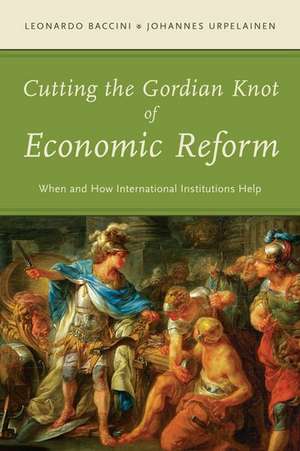Cutting the Gordian Knot of Economic Reform: When and How International Institutions Help
Autor Leonardo Baccini, Johannes Urpelainenen Limba Engleză Hardback – 15 ian 2015
Preț: 551.25 lei
Preț vechi: 790.51 lei
-30% Nou
Puncte Express: 827
Preț estimativ în valută:
105.50€ • 109.73$ • 87.09£
105.50€ • 109.73$ • 87.09£
Carte tipărită la comandă
Livrare economică 03-09 aprilie
Preluare comenzi: 021 569.72.76
Specificații
ISBN-13: 9780199388998
ISBN-10: 0199388997
Pagini: 280
Dimensiuni: 236 x 155 x 25 mm
Greutate: 0.5 kg
Editura: Oxford University Press
Colecția OUP USA
Locul publicării:New York, United States
ISBN-10: 0199388997
Pagini: 280
Dimensiuni: 236 x 155 x 25 mm
Greutate: 0.5 kg
Editura: Oxford University Press
Colecția OUP USA
Locul publicării:New York, United States
Recenzii
Every once in a long while a major puzzle in the study of politics and economics is solved. Baccini and Urpelainen have done just that in this important book. Through careful political-economy theorizing, clear quantitative analysis and penetrating, theoretically-sophisticated case analysis, they explain when international institutions effectively combine with domestic political conditions to promote economic reform and when they do not. They make a powerful and thoroughly convincing case for the advantages that preferential trade agreements with the United States or the European Union can have over multilateral arrangements or bilateral agreements with states such as China. They show clearly how international institutions can serve as credible commitment devices for leaders facing stiff domestic opposition to reform. Anyone interested in development must read this wonderful book.
Baccini and Urpelainen offer a compelling account of the causes and consequences of North-South trade agreements. By showing that these agreements have enabled comprehensive economic reforms beyond trade liberalization, the book offers an important and timely contribution to the study of international economic institutions. The book will be a key reference to scholars and students of international and comparative political economy.
Baccini and Urpelainen marshal an impressive array of evidence to support a novel and surprising theory of the dynamics of economic reform. Preferential trading agreements are not merely steps towards incremental trade liberalization. Instead, PTAs are important levers of domestic reform, allowing leaders to do two things: make credible commitments that they otherwise could not and buy support from interests who would otherwise be implacably opposed.
Baccini and Urpelainen offer a compelling account of the causes and consequences of North-South trade agreements. By showing that these agreements have enabled comprehensive economic reforms beyond trade liberalization, the book offers an important and timely contribution to the study of international economic institutions. The book will be a key reference to scholars and students of international and comparative political economy.
Baccini and Urpelainen marshal an impressive array of evidence to support a novel and surprising theory of the dynamics of economic reform. Preferential trading agreements are not merely steps towards incremental trade liberalization. Instead, PTAs are important levers of domestic reform, allowing leaders to do two things: make credible commitments that they otherwise could not and buy support from interests who would otherwise be implacably opposed.
Notă biografică
Leonardo Baccini is Assistant Professor of International Political Economy at the London School of Economics and Political Science Johannes Urpelainen is Associate Professor of Political Science at Columbia University.












